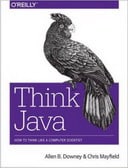
Think Java: How to Think Like a Computer Scientist is an introduction to computer science and programming intended for people with little or no experience. We start with the most basic concepts and are careful to define all terms when they are first used. The book presents each new idea in a logical progression. Larger topics, like recursion and object-oriented programming, are divided into smaller examples and introduced over the course of several chapters.
Book Description
Topics included: The way of the program • Variables and operators • Input and output • Void methods • Conditionals and logic • Value methods • Loops • Arrays • Strings and things • Objects • Classes • Arrays of objects • Objects of arrays • Objects of objects • Development tools • Java 2D graphics • Debugging.
Download Free PDF / Read Online
Publisher: Green Tea Press
Published: April 2017
Format(s): PDF, HTML(Online)
File size: 1.33 MB
Number of pages: 291
Download / View Link(s): PDF, Online